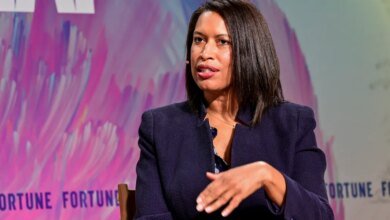Big investors scale back risky bond exposure after storming rally

Stay informed with free updates
Simply sign up Sovereign bonds myFT Digest – delivered straight to your inbox.
Large investors are trimming their exposure to riskier corporate debt, betting that the surge in recent years has left the market vulnerable to a sell-off if the global economy falters.
Asset managers, including BlackRock, M&G and Fidelity International, have shifted toward safer corporate or government bonds in response to the sharp decline in credit spreads in the United States, meaning investors get little reward for taking on additional risk.
Some investors are concerned that the rally, driven by easing concerns about the global trade war and expectations of deeper interest rate cuts by the US Federal Reserve, has left the credit market pricing in an overly optimistic scenario for global economic growth.
“Credit spreads are so tight that there is no ability to tighten them further,” said Mike Riedel, a fund manager at Fidelity International, referring to the extra yield that corporate bonds provide compared to very safe government debt.
“If anything goes wrong in the world, the differences could widen dramatically,” he warned. Fidelity International has a short position against developed market credit in flexible global bond funds, meaning it stands to benefit if spreads widen.
Investment grade bonds in the United States and Europe now offer about 0.8 percentage points of additional yield on government debt, down from more than 1.5 percentage points in 2022 and near their lowest levels since the global financial crisis.
This “ongoing tightening” has prompted the world’s largest asset manager to shift toward higher-rated, shorter-dated debt, said Simon Blundell, co-head of active European fixed income at BlackRock.
Blundell added that the market is “now priced in a moderate scenario” of lower interest rates and stable growth in the US, which represents a “risk/reward”. [that] This certainly lends itself to a defensive stance in credit markets.
In some cases, credit spreads – an indicator of investors’ assessment of how risky a borrower is – have turned negative.
Bulls argue that ultra-tight spreads are justified by corporate balance sheets that have strengthened in recent years and a U.S. economy supported by expectations of at least four more quarter-point interest rate cuts from the Fed by the end of next year.
However, spreads have widened slightly in recent days as renewed trade tensions between the US and China – and tension over the collapse of auto parts supplier First Brands Group – punctured investors’ upside.

Paul Niven, manager of the £6.4bn F&C Investment Trust, said he had cut his credit position to “neutral” in recent weeks, selling high-yield bonds because “the cost asymmetry compared to government bonds has become costly”.
There were signs of investors pulling back in some of the riskier areas of the broader corporate debt market. A number of leveraged loans, including a $5.8 billion issuance from specialty chemicals maker Nourion, and another deal worth more than $1 billion from pharmaceutical company Mallinckrodt, have been delayed in recent weeks. At the same time, prices for some outstanding loans fell as investors instead opted for safer debt.
“There have been quite a few blowouts in the last week or two, which has shaken confidence,” said one high-yield debt trader.
Some hedge funds are avoiding the debt of weaker companies, in response to what they see as a random tightening of spreads this year.
“The corporate credit market is not only very tight, it is also equally tight among companies,” said Andrea Seminara, founder and chief investment officer of London-based credit hedge fund RedHedge. “There are a lot of unique risks that can’t be priced at all [by the market]”.
The total return on corporate bonds that investors receive, known as the “all-in yield,” is still considered attractive by many, due to rising government bond yields in recent years. The yield to maturity on US investment grade bonds is about 4.8 percent, according to the ICE Index.
“Corporate bond yields are attractive and worth owning now,” said Ben Lord, fund manager at M&G Investments. But he added that the company was moving into higher-rated corporate credit and areas such as covered bonds issued by life insurance companies.
“The cost of switching out of and purchasing BBB-rated unsecured bonds is as low as it has ever been,” he said.
2025-10-16 04:00:00




